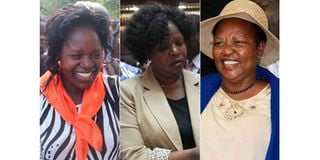This is why we need to elect more women

From left: Rangwe MP Lilian Gogo, Kabondo Kasipul MP Eve Obara and Turkana Woman Representative Joyce Emanikor.
What you need to know:
- Kenya has achieved some progress, with more women legislators now in office than in the pre-2010 Constitution period.
- That they occupy a dismal portion of parliamentary seats is a stark reminder of the pervasive and persisting nature of gender inequality.
In a month, Kenyans will be electing leaders who will represent them for the next five years. The election season is when I feel powerful because I get to exercise my right to vote for the decision-makers in my country.
Oftentimes, however, politics frustrates me because I feel elected politicians do not reflect my views, probably because we keep electing the same type of people – men – over and over again.
Yes, most officeholders are men, who make less than 50 per cent of our population. The dismal number of elected women bothers me. They rarely hold leadership roles, and the progress towards achieving gender balance in Parliament is slow—the two-thirds gender rule notwithstanding.
Politics is largely a ‘boys’ club’ and any woman involved is viewed as the exception to the rule rather than the norm. This has fostered a culture that favours men. Globally, the proportion of women elected to office increased from 13 per cent in 2000 to 25 per cent in 2020. In Africa, the number increased from 11 to 24 per cent.
At the beginning of 2020, women were leading just 20 of the 193 nations, and occupying a quarter of parliamentary seats globally. In Africa, only Rwanda has women sharing seats equally with men, or more in Parliament.
Kenya has achieved some progress though, with more women legislators now in office than in the pre-2010 Constitution period. That they occupy a dismal portion of parliamentary seats is a stark reminder of the pervasive and persisting nature of gender inequality.
Some people may ask why it matters if there are more women elected. It is a matter of equity and human rights, which are cornerstones of a democratic society. It matters because women’s representation ensures democracy functions effectively.
For political institutions to be democratically legitimate, they must be all-inclusive. This can only happen with a greater representation of women in the National Assembly, the Senate and county assemblies.
Electing women creates room to revise laws that discriminate against girls and women. Often, people’s interests and priorities are shaped by their social, economic and ethnic differences, thus female legislators from different backgrounds bring an array of issues to the table for consideration, and propose solutions accordingly.
What’s more, any democratic system benefits when it has people from diverse backgrounds represented in its political institutions.
As is the norm, politicians promise the electorate heaven every election season. The two leading coalitions in this election—Kenya Kwanza and Azimio la Umoja One Kenya—have, so far, made elaborate and enticing promises to women.
Whichever side wins, I hope they fulfil their promises. These promises remind us that it is now time to acknowledge that more women in politics will unquestionably result in better representation, governance, and a better Kenya.
So, this is why I would urge you to go out on August 9 and vote for capable and qualified women: Women are more effective at building consensus and advancing Bills in Parliament and the county assemblies.
Secondly, to get more women running for office, women need role models.
Check out which women are running in your county—and if they align with your values and beliefs, vote for them. I’m not telling you to vote for women just for the sake of voting for women. I’m telling you to vote for women so that we can create positive change in this country.
Vote wisely!





